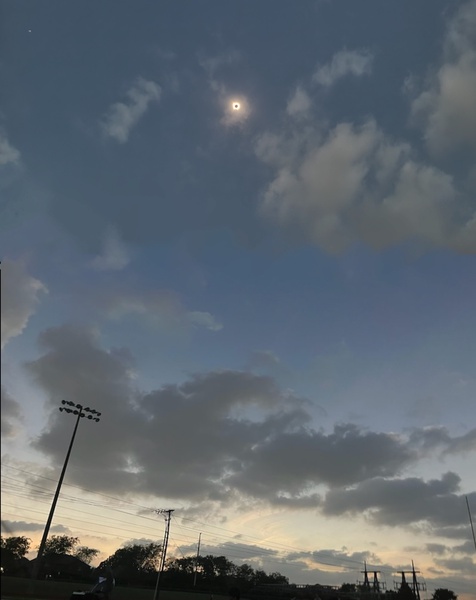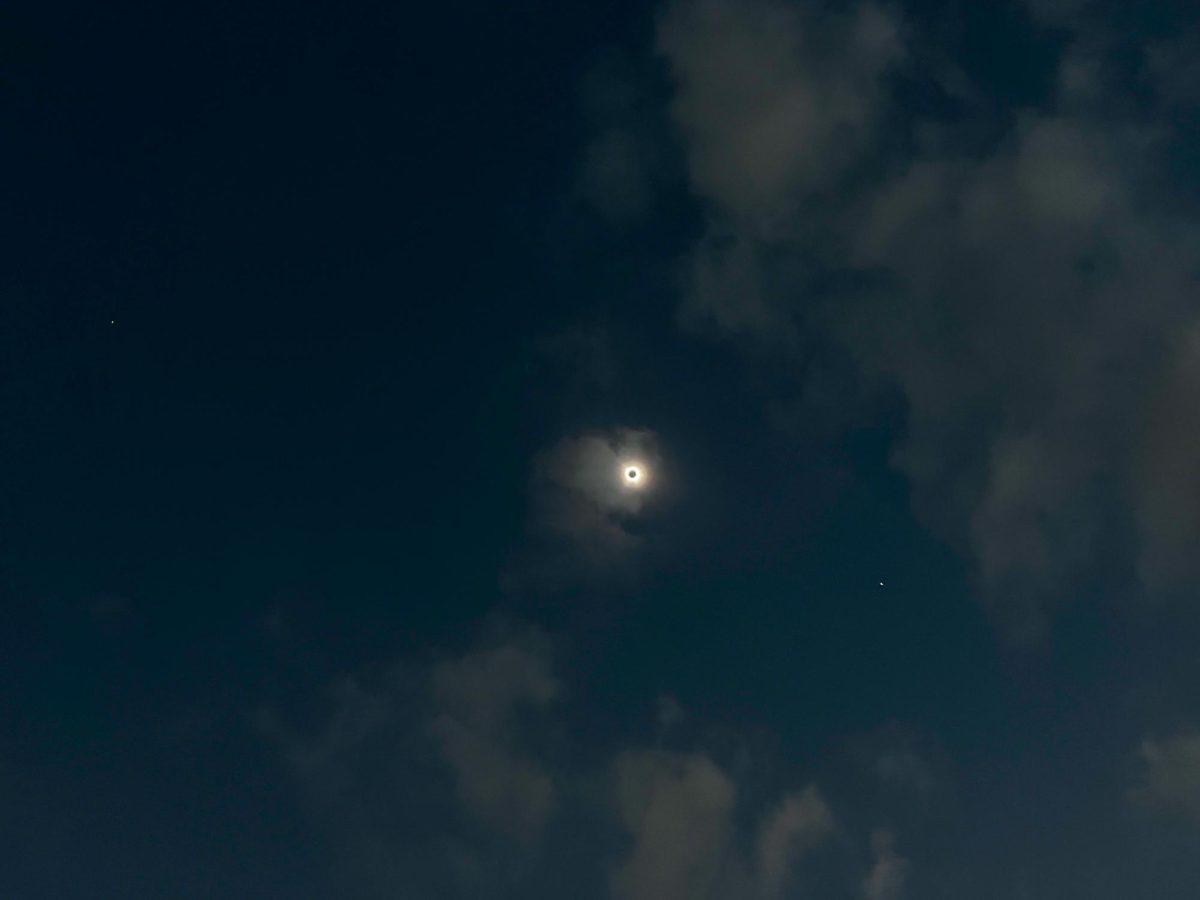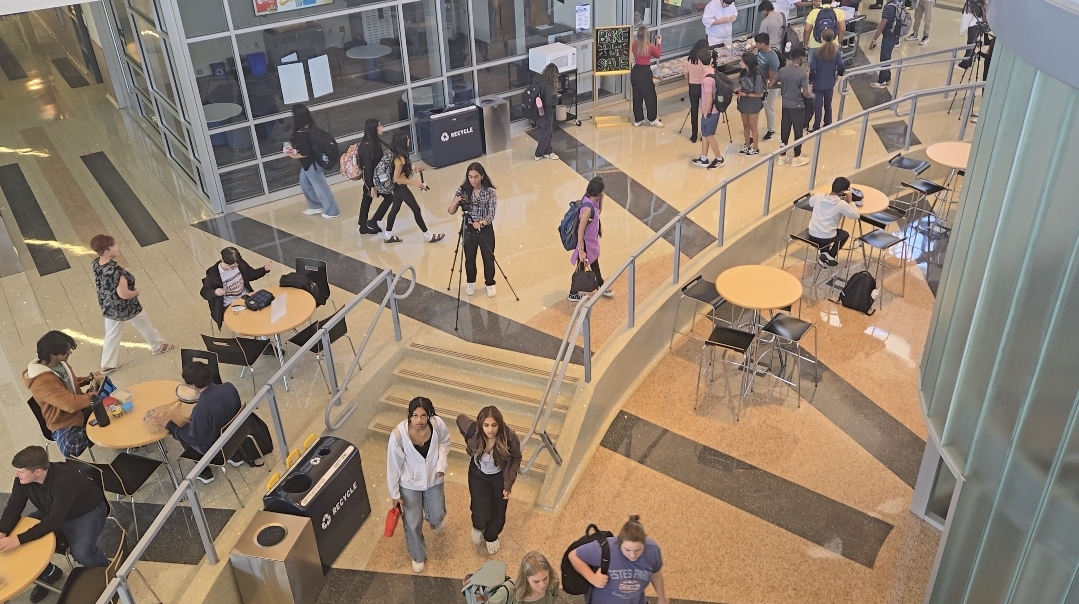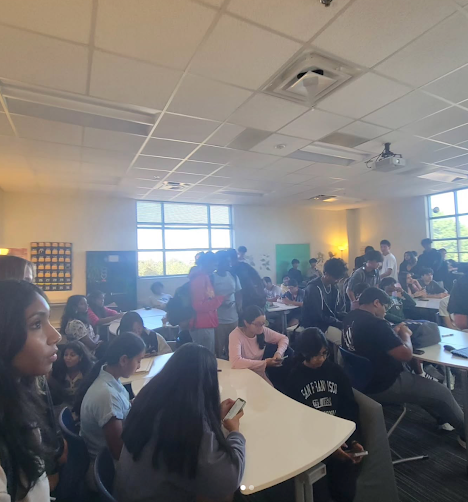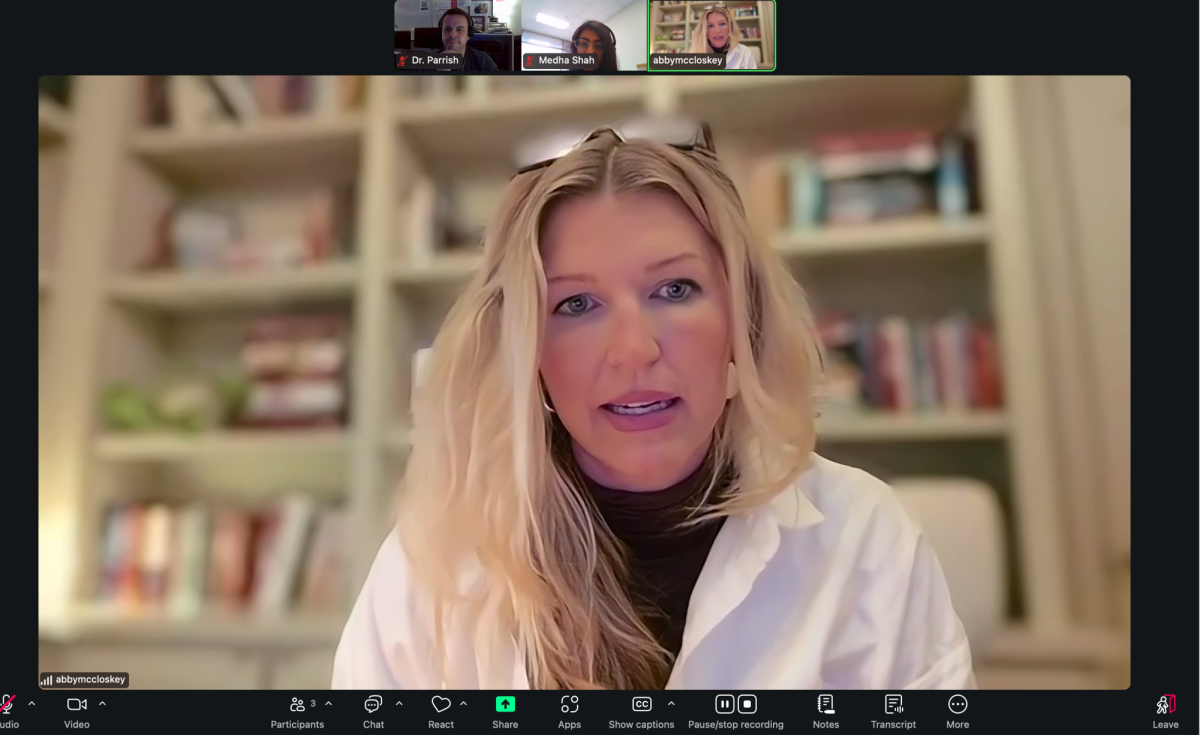FRISCO, TX- Teachers handed out special tinted glasses as students lined up and left the classroom with the teacher leading the way. The students put the glasses over their eyes (or attempted to over their glasses) and looked at the partial shadow of joy as it crossed the sun. They walked to the football field and soon began to find their friends. Teachers facilitated the event as the field was fully covered by darkness as the sun became fully obscured.
On April 8, 2024, Frisco Independent School District (FISD) students had the once-in-a-lifetime opportunity to watch the total solar eclipse from school. FISD gave responsibility to each campus to create a committee to plan the solar eclipse for each school. District meetings were held for safety and information for the staff, including training for the procedures related to the solar eclipse.
Nicole Ellis, the Math and Science Instructor Coach, was in charge of most of the plans for the eclipse and was part of the committee that planned the event.
“[FISD t]old each campus to have a committee formed to plan the eclipse,” Ellis said. “[It was m]ade up of myself, Mr. Sears, Officer Jefferson, Coach Webb, Ms. Goodwin, Nurse Braun, Ms. Yeates, Ms. Mcfadden, and then [Principal] Henderson.”
Principal Henderson further explained her role in adhering to safety procedures. While Assistant Principal Mr. Sears had a vital role as the official head of the committee and the administrator over all the safety procedures, Ms. Henderson helped enforce them.
“The committee had to report to me for their plans, so I gave overall approval of their plans but wasn’t actually part of their committee,” Henderson said.
Ellis did many things to help the school administer the solar eclipse viewing event, helped the students’ safety, and allowed the school to consider future eclipse viewings.
“I facilitated receiving the glasses, distributing them…training staff on the safety for students when we’re out there, facilitating the advisory lesson, organizing the opt-out section for students who didn’t want to view it, staff duty sections for where they would stand,” Principal Henderson said.
Various cultures recognize this rare event in different ways. For example, Hindus perceive a solar eclipse as inauspicious, and they throw away any food touched by the sun and avoid going outside. Additionally, there is the culturally held belief that a dragon swallows the sun during a solar eclipse in China. In Vietnam, the belief is that a frog eats the sun. FISD wanted to respect these differences for the solar eclipse viewing and the information given.
“Ms. Henderson got most of the safety meetings while I got more of the science meetings like how to teach the eclipse in science classrooms and making sure we were culturally sensitive to any traditions and cultural beliefs,” Ellis said.
“Mostly the information that went out was about the logistics of the day. Parents and students knew… they could opt out [if it went against their beliefs],” Henderson said. “We [h]ave a space for those students to go during the event. On a district level, [by] giving the option of a school absence people could know they didn’t have to participate.”
Henderson had an imperative role in receiving information for the safety of the students.
“Henderson got a document that was 15-20 pages with explicit instructions on what the committee was doing and how to stay safe,” Cole said.
These instructions were valuable to ensure the safety and security of Centennial students with information on staff duty locations, entrance closures, time frames, bell schedules, staff training, and the location of the football field.
Centennial administration wanted their students to be able to appreciate this experience as an opportunity for educational learning and cultivate interest in a natural phenomenon such as this.
“In science, we do a lot of talking about phenomena and trying to understand why they’re occurring. This was a real-life phenomenon that we could experience in the path of totality,” Ellis said. “Us being in school allows us to view it together and discuss this phenomenon in classes such as environmental systems and the astronomy classes.”
Safety concerns caused the district to implement special procedures to ensure the safety of both students and teachers going outside to see the eclipse. Assistant Principal Cami Cole expressed the preparation that had to go into addressing these concerns.
“We [were] obviously concerned especially with our special education students because they don’t really understand the extent of why they need to wear the eyewear,” Cole said. “So we just staffed those areas more. There was also the concern [that] we didn’t know how blackout it would get and traffic and safety conditions.”
Ellis communicated to the teachers about the plans for the eclipse and helped put those plans into action the day of.
“Leading up to the eclipse, I was distributing glasses to the classes and communicating the backup plan in case it was cloudy,” she said. “I communicated that we were still going out because the weather was nice and I helped administration get everyone out of the building, and then I was viewing it too.”
It was an extra special experience for Ellis because she was seven months pregnant when she saw the eclipse. It was a special experience for Cole, who hadn’t been able to see one before.
“The biggest part with the eclipse is experience with it,” Cole said. “For me personally, I didn’t realize how cool and amazing…it was until I got to experience it. Until you experience it you don’t really realize the depth of the experience.”
FISD would be willing to hold a solar eclipse viewing again in the future for its students.
“I feel like we can especially since it went so well,” Cole said. “We didn’t have that many issues, and we know how to do this in the future.”
“I think from what I was looking at there won’t be a totality…but in general those types of events are more coordinated at the district level,” Henderson added. “If it was in the next couple years and there’s a partial eclipse, there might be more people interested in seeing it- like if the freshman class saw the total and wanted to see the partial.”
Overall plans for a future eclipse viewing are tentative, but there is still hope for more.

